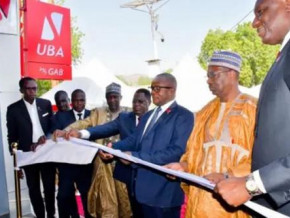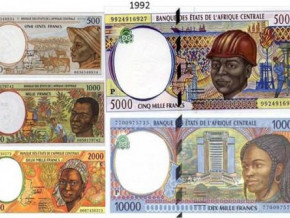
Douala-Bangui corridor: Truckers spend up to CFAF255,000 at checkpoints, survey reveals

(Business in Cameroon) - Truckers traveling along the Douala-Bangui corridor disburse an average of CFAF64,000 and a maximum of CFAF255,000 at checkpoints along the corridor, a recent survey reveals. According to the survey published by the European Union (EU)-funded Observatory of Abnormal Practices (OPA) on the major corridors in Central Africa, these expenses average just CFAF22,941 with a maximum of CFAF126,000 on the Douala-Ndjamena corridor, which connects Cameroon and Chad.
Based on those figures, the OPA concludes: "Checks on the Douala-Bangui corridor (1,435 km) remain more costly than on the Douala-N'Djamena section (1,934 km), even though this route is shorter (400 km less)."
The observatory adds that on average, checks along the Douala-Bangui corridor cost “almost three or four times as much as those on the Douala-N'Djamena corridor. Correlatively, for every 100 kilometers, checks cost on average much more on the Douala-Bangui corridor than on the Douala-N'Djamena corridor, on both the outward and return journeys."
According to the OPA, payments made at road checks are the most abnormal practices corridor users mostly report in the Central African region.
In the survey, the OPA indicates that those payments are “illegal fees”, “escort charges” (CFAF50,000 for security forces to escort the rucks due to insecurity in the Central African Republic), and customs fees charged for the extra goods transported by truckers apart from the declared transit goods. However, transporters’ unions claim they mostly represent bribes paid directly to the police, gendarmes, road safety agents, and other customs officers who swarm the corridors.
CFAF175 billion in bribes
In a report published in 2018, the unions of transporters using the Douala-Ndjamena corridor estimated the 78,000 trucks active on the route paid CFAF175 billion in bribes. On both the Douala-Ndjamena and Douala-Bangui corridors, most of the payments are made on the Cameroonian (Douala) side, weighing on the cost of trade between Cameroon, Chad, and the Central African Republic.
In its survey, the OPA reveals that "on the Douala-N'Djamena corridor, the longest (1,934 km on the currently functional route which passes through Touboro and Moundou), since the 1st quarter of 2022, OPA observers have noted 93 potential stopping points, 61 of which are checkpoints. Of the checkpoints identified, 57 are located on Cameroonian territory (over 1,339 km), compared with 04 on Chadian territory (over 590 km). As for the Douala-Bangui corridor (1,435 km long), there were 80 stopping points, including 57 checkpoints, more than 40 of which were in Cameroon."
This means that along the Douala-Ndjamena corridor, Chad has a police, gendarmerie, or customs checkpoint every 147.5 km but Cameroon has one every 18 kilometers. Along the Douala-Bangui corridor, 70% of the checkpoints are Cameroonian, many of them illegal.
Often illegal checkpoints
In a letter sent to his counterpart in charge of territorial administration on April 6, 2022, Cameroon's Minister of Defense (Mindef) revealed that, following reports of a multitude of checkpoints along the Douala-Ndjamena corridor, his services had carried out investigations. This investigation identified 66 checkpoints on the Cameroonian side, including 39 illegal checkpoints and 27 legal mixed checkpoints.
"This multiplicity of checkpoints, which is a real ordeal for road users, is often prescribed by certain local administrative authorities (sub-prefects, prefects, governors)," the Defence Minister revealed.
The multiplication of checkpoints on corridors in Central Africa, which hampers intra-community trade, has always been criticized. However, despite not-yet-implemented institutional measures, nothing has been done to suppress them. An example of the said institutional measures is the Regional Transit Program adopted by Cemac countries in 2006. Officially, this program, of which OPA is one of the offshoots, aims to lower the number of checkpoints to five on the Douala-N'Djaména corridor, and to three on the Douala-Bangui corridor.
Another measure not yet implemented is the deployment of mixed CEMAC brigades. According to the OPA, this particular measure should be accelerated.
Brice R. Mbodiam
Mags frontpage
- Most read 7 days
- shared 1 month
- read 1 month






























